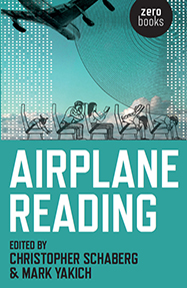It was warm coming down the concourse even in the late evening. The moon lit up the taxiway around the blinking lights and illuminated the planes. It was winter around the airport but the heat was on inside. I wandered past the B gates carrying my overnight bag and computer case. As I passed a snack stand a passenger was just paying for a Snickers. I quipped "Satisifies!" to the passenger as he walked past me ripping open the candy bar. The passenger grinned.
This was late December 2006, before a red-eye flight from Sacramento to O'Hare; I was on my way to the Modern Language Association conference in Philadelphia, where I was presenting a paper on airports in contemporary literature the next morning. Near the end of the concourse I found the airport brew pub, and I settled into a chair at a quiet table in the corner. I ordered a brown ale. It was tall and cold, and hit the spot. I had about thirty minutes to kill before boarding would begin.
I gradually became aware of a couple at the bar whose flight had been canceled. I overheard that they were going to miss their daughter’s wedding the next day unless they could get on the last flight to Houston, which was already overbooked. The father of the bride looked more dejected with each drink. The mother starred stoically at the mirror behind the bar. Their young son was sobbing quietly nearby, his little body sagging against a large roller bag.
Another passenger at the bar was rooting for a particular team on TV—a score, a block, some part of some game. The father of the bride, very drunk by this point, perked up and apparently did not agree with the other passenger’s choice in teams; the father of the bride stumbled over and took a swing at the sports fan, and in the next moment bar stools were toppling and it appeared as if the two men were climbing on top of one another, fists and legs pumping. The bartender stood gawking, still in the middle of pouring a pint glass, foam running over the rim.
No one knew what to do: this was not exactly terrorism, but it was vaguely similar given the fact that two of the very men who had been cleared for security were now engaged in violent conflict. I for one felt a little terrified. At the same time, the fight had this removed quality, almost slow motion; just out the window, other men were loading bags into the bellies of planes with similar heaves and thrusts.
The wife and son dragged the pummeled father of the bride out of the fray, and the sports fan went back to the bar and ordered another beer, looking no worse for wear. An airport police officer ambled up after what seemed like way too many minutes, and spoke in serious tones with the bartender, who gestured, pointed, and mimicked some of the punches that had been thrown. Another police officer appeared a few minutes later, and together, hands on their pistol butts, they approached the battered father of the bride. After some stern words, the airport police officers escorted the father of the bride out toward the terminal, his wife and son following, sobbing together now, pulling their three stuffed roller bags behind them.
I boarded my plane and flew to Chicago, where I sat bleary-eyed in the predawn concourse waiting for my flight to Philadelphia. On the Airport CNN station they played looped coverage of a recent bombing: smoke pouring from blown out windows, with bloody bodies carried out and past the shaking camera lens. My MLA paper was titled "Ground Zero Perception," and it was about how airports frame scenes of violence. Yet after the airport bar fight in Sacramento, and the relentless looping of the blasted urban space on the TV hanging from the ceiling in O'Hare, I didn't know if I was more or less prepared to talk about this subject.
Christopher Schaberg is one of the co-editors of Airplane Reading. His book The Textual Life of Airports was published last month.






